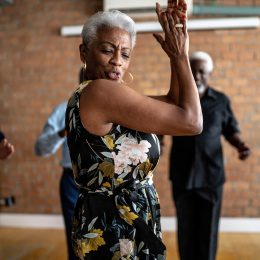7-Day Sleep Challenge: Make Your New Sleep Habits Stick
Quality shuteye is vital for good health — but it’s not always easy to achieve. Boost your chances of a good night’s rest with these tips.
Keep up with the 7-Day Sleep Challenge here.
Throwing one or two new sleep-friendly strategies into your afternoon and evening is helpful for that night’s sleep. But what’s even better is building them into your nightly routine, so they become automatic, says senior fitness expert Larysa DiDio..
That can be a big boost for your brain, because your mind is constantly trying to automate different processes. “Think about brushing your teeth,” says DiDio. “You probably do it the same way every time, right? In part, that’s because your brain has set up that everyday routine for maximum efficiency, so it doesn’t need to spend energy thinking about it step-by-step.
“Sleep can be the same way,” she continues. “If you set things up in the same sequence every day, that’s not boring — it’s incredibly useful because your brain will start to get you ready for sleep as soon as you start that routine.”
Because of that, try kicking it off the same way every day. “And don’t give up after just two or three nights — it takes two to four weeks for new habits to really stick,” she says.
7 Ideas for Solidifying an Effective Nightly Routine
Exercise Earlier in the Day
Daily exercise can help you fall asleep more easily and sleep more soundly. “Try to exercise at least three hours before bedtime so that your body has time to wind down,” reminds DiDio. One routine you can slide into your afternoon is this Quick Cardio Workout for Better Sleep.
Of course, you can always hit the gym for a favorite SilverSneakers class — or turn on your computer to join one of the many virtual SilverSneakers LIVE classes or an online class taught by your local SilverSneakers Community instructors.
Have a Regular Bedtime
Whether you are an early bird or a night owl, aim to go to bed at the same time every night and wake up at the same time every morning — even on weekends. This helps regulate your body’s internal clock, which can help you fall asleep and stay asleep. If possible, also try to avoid napping late in the afternoon and evening.
Start to Unwind an Hour Before Bed
“Use the hour before bed to create a relaxing bedtime routine,” says DiDio. “This can include some of the strategies we worked on earlier in the Sleep Challenge, such as the bedtime stretches or the gentle tai chi sequence.”
You can even include some of the techniques meant to help beat insomnia, she adds. This includes doing a simple breathing or visualization exercise before you turn in for the night. Or a head-to-toe muscle relaxation exercise.
Aim to turn off electronic devices at least a half hour before bedtime. Gazing at bright screens, including laptops, phones, tablets, and televisions, disrupts your ability to relax and get to sleep.
Go to Bed Only When You’re Tired
If you feel too awake, you might not fall asleep easily. “If you aren’t asleep after 20 minutes, get out of bed and leave the bedroom,” says DiDio. “Try doing something relaxing such as reading or listening to quiet music.”
Make Your Bedroom a Restful and Quiet Space
“If you’re having trouble falling asleep, your bedroom may be part of the problem,” says DiDio. “You want it to be dark, cool, quiet, and clutter free.”
Subscribe to our newsletter
It's quick and easy. You could be one of the 13 million people who are eligible.
Already a member? Click to discover our 15,000+ participating locations.
Follow Us
Remember the tips to Create the Right Sleep Space
- Lower the bedroom temperature to around 60 to 67 degrees
- Clear off your nightstand and do some decluttering so the room is inviting
- Use a fan, white noise machine, or earplugs if outside noise is an issue
- Use a traditional alarm clock instead of your phone (to avoid the blue light that tells your brain to “wake up”)
- And if you like to read before bed, switch your tablet reader to night mode, or read a good, old-fashioned paper book
Avoid Eating Late and Having Stimulants Close to Bedtime
Eating a big meal too close to your bedtime may cause your metabolic system to start working and make it harder to fall asleep, says DiDio. If you find yourself hungry and need a bedtime snack, opt for some kiwi fruit or a small handful of nuts. For more, read What to Eat for Better Sleep here.
Give it Time
If you’ve created and stuck to your new nighttime routine for three to four weeks, but you’re still exhausted, talk to your health care provider. They can rule out medical issues that might be keeping you up at night or refer you to a sleep specialist who can diagnose sleep disorders.
Check Your SilverSneakers Eligibility Instantly
SilverSneakers members can go to thousands of gyms and fitness locations across the nation, plus take SilverSneakers LIVE online classes that are designed for seniors of all levels. If you have a Medicare plan, it may include SilverSneakers—at no additional cost. Check your eligibility instantly here.
Not eligible for SilverSneakers? You can still get 200-plus free SilverSneakers On-Demand videos and stay in touch with us by creating your online account.





